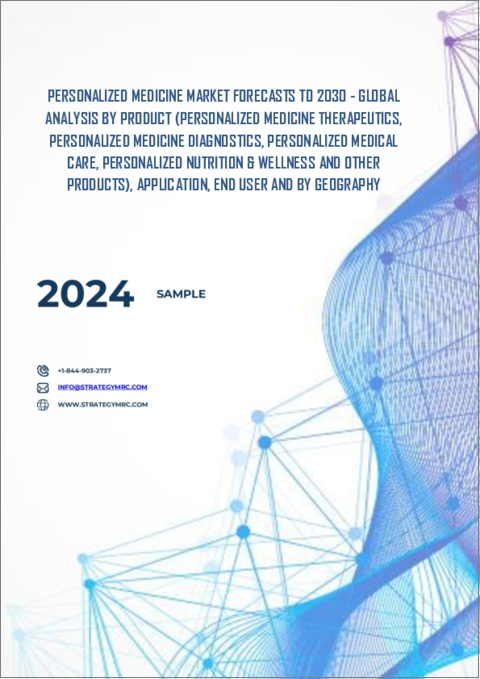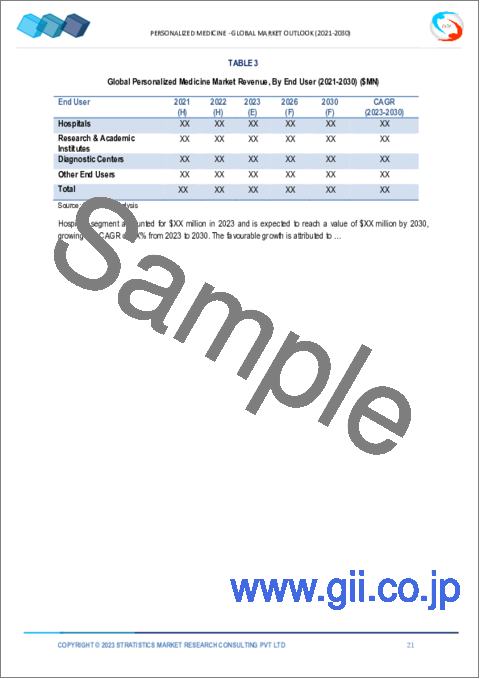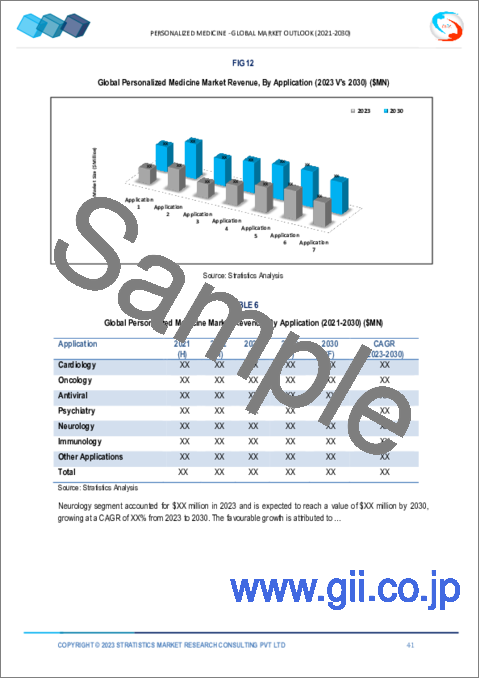|
|
市場調査レポート
商品コード
1383451
個別化医療市場の2030年までの予測:製品別、用途別、エンドユーザー別、地域別の世界分析Personalized Medicine Market Forecasts to 2030 - Global Analysis By Product, Application, End User and By Geography |
||||||
カスタマイズ可能
|
|||||||
| 個別化医療市場の2030年までの予測:製品別、用途別、エンドユーザー別、地域別の世界分析 |
|
出版日: 2023年11月01日
発行: Stratistics Market Research Consulting
ページ情報: 英文 200+ Pages
納期: 2~3営業日
|
- 全表示
- 概要
- 図表
- 目次
Stratistics MRCによると、世界の個別化医療市場は2023年に3,390億米ドルを占め、予測期間中にCAGR 13.0%で成長し、2030年には7,970億米ドルに達すると予測されています。
個別化医療は、薬理ゲノム検査に大きく依存しています。医療専門家は、患者の遺伝子構成が治療への反応にどのような影響を及ぼすかを特定することで、患者ごとに最も安全で効果的な薬剤と用量を選択することが可能になります。特定の遺伝子変異を発見し、これらの問題の根本的な原因をターゲットとする医薬品を開発することで、個別化医療は珍しい病気の診断と治療に革命をもたらしています。
世界保健機関(WHO)によれば、がんは世界最大の死亡原因であり、2018年の死亡者数は960万人と推定されています。これは、世界中で約6人に1人ががんで死亡していることを意味します。
標的療法の台頭
個別化医療の分野は、標的治療薬の登場によって大きな恩恵を受けています。個別化医療に不可欠な要素のひとつが標的治療薬であり、患者の病気の遺伝的または分子的側面を明確に標的として作成されます。標的治療薬と標準的な治療薬を比較すると、副作用の減少がひとつの利点です。また、患者の遺伝子や分子プロファイルに基づいて治療法をカスタマイズすることで、副作用の確率が減少し、従来の画一的な治療法と比較して、より高い治療成績が得られることが多いです。このような薬が最も効きやすい患者を特定することで、個別化医療は成功の可能性を高める。
高コスト
法外な費用が参入の障害となり、個別化された治療が、それを手に入れる手段を持つ人々のために留保される可能性があります。このためヘルスケアに不平等が生じる可能性があり、個別化された最先端治療を受けられる人がいる一方で、受けられない人もいます。個別化された薬物療法には高額な費用がかかるため、ヘルスケア予算は圧迫され、保険会社や医療制度はこれをカバーすることが難しくなる可能性があります。そのため、国や地域のヘルスケアシステムが提供する最先端治療の数が制限される可能性があります。個別化医療は高額であるため、患者のなかには個別化医療を受けようとしない人も出てくる可能性があり、その結果、より安全で成功率の高い個別化医療を受けるチャンスを逃すことにもなりかねないです。
医薬品開発の効率化
科学的発見や研究成果は、効率的な医薬品開発システムの支援により、より迅速に実用的な治療法に転換される可能性があります。その結果、遺伝子学や分子生物学における最新の進歩から、患者はより早く、より迅速にカスタマイズされた治療法の恩恵を受けることになります。さらに、より効果的な医薬品開発により、コスト削減も期待できます。そのため、より幅広い患者が、手頃な価格で入手しやすくなったオーダーメイド薬から恩恵を受け、それを手に入れることができるようになり、市場の成長が促進される可能性があります。
限られたアクセシビリティ
オーダーメイド薬が広く利用されない場合、ヘルスケア格差が悪化する可能性があります。個別化された療法を受ける余裕のある患者が劣悪な、あるいは効果のない治療を受ける一方、こうしたサービスを受ける余裕のない患者が劣悪な、あるいは効果のない治療を受ける場合、健康状態に差が生じる可能性があります。コストを考慮すると、患者が個別化治療を選択することができなくなり、医療に対する患者の自主性が損なわれる可能性があります。個別化医療を利用できる人が減るということは、この分野の研究と治療の成果に不可欠な多様な患者データの不足を意味するかもしれないです。データが不十分だと、新しい治療法や診断法の進歩が妨げられる可能性があります。
COVID-19の影響
COVID-19パンデミックに対するヘルスケアシステムと資源の最初の反応は、ウイルスの制御と封じ込めに向けられました。一部の標的医療プロジェクトを含む数多くの資金が、緊急でない医療活動から取り上げられました。個別化医療プロジェクトは、パンデミックの間に起きた遠隔医療と遠隔モニタリングの大幅な増加から恩恵を受けることができます。遠隔診療により、患者のデータを収集し、個別化された治療レジメンに組み込むことが可能になり、特に慢性疾患やメンタルヘルスの問題の管理は市場成長にプラスの影響を与えています。
予測期間中、個別化医療治療分野が最大となる見込み
個別化医療分野は、ゲノム配列決定技術の発展や遺伝子・分子データへのアクセスの増加により、個別化医療市場が着実に拡大していることから、有利な成長を遂げると推定されます。分子生物学と遺伝学の知識が拡大するにつれて、この成長は今後も続くと予想されます。遺伝カウンセラーは、遺伝情報が健康に及ぼす影響について患者を教育することにますます積極的になってきています。これは、患者が十分な知識を持った上で決断することが重要であるため、オーダーメイド治療には欠かせない部分です。
予測期間中にCAGRが最も高くなると予想されるのは精神医学分野です。
精神科分野では、どの向精神薬が最も効きやすく、どの薬が副作用を起こしやすいかを見極める際に非常に役立つため、予測期間中のCAGR成長率が最も高くなると予想されます。特定の精神科治療薬に対する患者の反応を予測するには、遺伝子検査やバイオマーカー研究が役立ちます。これによって医療従事者は、精神疾患の治療で典型的な、適切な処方と用量を決定するための試行錯誤の、時に長引くプロセスから解放されます。糖尿病や心血管疾患のような併存疾患は、精神疾患を持つ人によく見られます。
最大のシェアを占める地域
北米は、アボット、キアゲン、GEヘルスケア、BASF SEなど多くの重要な企業が存在するため、予測期間中最大の市場シェアを占めると予測されています。さらに、北米では糖尿病、心臓病、がんなどの慢性疾患の罹患率が上昇しており、より焦点を絞った効率的な治療を提供するカスタマイズされた医療ソリューションに対する需要が高まっています。さらに北米は、イノベーションと最先端技術の導入に高い価値を置く、非常に洗練されたヘルスケアシステムを誇っています。このため、カスタマイズ医療技術がこの地域で出現し、広く利用されるようになっています。
CAGRが最も高い地域:
アジア太平洋地域は予測期間中に最も高いCAGRを示すと予測されます。これは、同地域における製薬企業の存在と、中国やインドのような人口の多い国の購買力の上昇が市場拡大の要因となっているためです。さらに、個別化された投薬のコストの上昇や、オーダーメイドのソリューションの作成を強化するためのハイテク処理の使用により、市場は発展すると予測されています。さらに、アジア太平洋地域は人口が大きく拡大しており、個別化された薬など、より個別化された医療へのニーズが高まっています。
無料カスタマイズサービス:
本レポートをご購読のお客様には、以下の無料カスタマイズオプションのいずれかをご利用いただけます:
- 企業プロファイル
- 追加市場プレーヤーの包括的プロファイリング(3社まで)
- 主要企業のSWOT分析(3社まで)
- 地域セグメンテーション
- 顧客の関心に応じた主要国の市場推計・予測・CAGR(注:フィージビリティチェックによる)
- 競合ベンチマーキング
- 製品ポートフォリオ、地理的プレゼンス、戦略的提携に基づく主要企業のベンチマーキング
目次
第1章 エグゼクティブサマリー
第2章 序文
- 概要
- ステークホルダー
- 調査範囲
- 調査手法
- データマイニング
- データ分析
- データ検証
- 調査アプローチ
- 調査ソース
- 1次調査ソース
- 2次調査ソース
- 前提条件
第3章 市場動向分析
- 促進要因
- 抑制要因
- 機会
- 脅威
- 製品分析
- アプリケーション分析
- エンドユーザー分析
- 新興市場
- 新型コロナウイルス感染症(COVID-19)の影響
第4章 ポーターのファイブフォース分析
- 供給企業の交渉力
- 買い手の交渉力
- 代替品の脅威
- 新規参入業者の脅威
- 競争企業間の敵対関係
第5章 世界の個別化医療市場:製品別
- 個別化医療
- 医薬品
- 医療機器
- ゲノム医療
- 個別化医療診断
- エソテリックラボサービス
- Direct-To-Consumer(DTC)診断
- 遺伝子検査
- 難解なラボテスト
- 個別化された医療
- 健康情報技術
- 遠隔医療
- 個別の栄養と健康
- 補完代替医療
- 小売栄養学
- その他の製品
第6章 世界の個別化医療市場:用途別
- 心臓病学
- 腫瘍学
- 抗ウィルス薬
- 精神科
- 神経内科
- 免疫学
- その他の用途
第7章 世界の個別化医療市場:エンドユーザー別
- 病院
- 研究・学術機関
- 診断センター
- その他のエンドユーザー
第8章 世界の個別化医療市場:地域別
- 北米
- 米国
- カナダ
- メキシコ
- 欧州
- ドイツ
- 英国
- イタリア
- フランス
- スペイン
- その他の欧州
- アジア太平洋
- 日本
- 中国
- インド
- オーストラリア
- ニュージーランド
- 韓国
- その他のアジア太平洋
- 南米
- アルゼンチン
- ブラジル
- チリ
- その他の南米
- 中東・アフリカ
- サウジアラビア
- アラブ首長国連邦
- カタール
- 南アフリカ
- その他の中東・アフリカ
第9章 主な発展
- 契約、パートナーシップ、コラボレーション、合弁事業
- 買収と合併
- 新製品の発売
- 事業拡大
- その他の主要戦略
第10章 企業プロファイル
- Abbott
- Dako A/S
- Exact Sciences Corporation
- Decode Genetics
- QIAGEN
- Precision Biologics
- Biogen
- Genelex
- IBM
- Genentech, Inc.
- 23andMe, Inc
- GE Healthcare
- Illumina, Inc
- ASURAGEN
- Aadi Bioscience, Inc.
- Takeda Pharmaceutical Company Ltd
- ARIEL Precision Medicine, Inc.
- Hoffmann-La Roche Ltd.
- Abbvie Inc
- Eli Lilly and Company
List of Tables
- Table 1 Global Personalized Medicine Market Outlook, By Region (2021-2030) ($MN)
- Table 2 Global Personalized Medicine Market Outlook, By Product (2021-2030) ($MN)
- Table 3 Global Personalized Medicine Market Outlook, By Personalized Medicine Therapeutics (2021-2030) ($MN)
- Table 4 Global Personalized Medicine Market Outlook, By Pharmaceutical (2021-2030) ($MN)
- Table 5 Global Personalized Medicine Market Outlook, By Medical Devices (2021-2030) ($MN)
- Table 6 Global Personalized Medicine Market Outlook, By Genomic Medicine (2021-2030) ($MN)
- Table 7 Global Personalized Medicine Market Outlook, By Personalized Medicine Diagnostics (2021-2030) ($MN)
- Table 8 Global Personalized Medicine Market Outlook, By Esoteric Lab Services (2021-2030) ($MN)
- Table 9 Global Personalized Medicine Market Outlook, By Direct-To-Consumer (DTC) Diagnostics (2021-2030) ($MN)
- Table 10 Global Personalized Medicine Market Outlook, By Genetic Testing (2021-2030) ($MN)
- Table 11 Global Personalized Medicine Market Outlook, By Esoteric Lab Tests (2021-2030) ($MN)
- Table 12 Global Personalized Medicine Market Outlook, By Personalized Medical Care (2021-2030) ($MN)
- Table 13 Global Personalized Medicine Market Outlook, By Health Information Technology (2021-2030) ($MN)
- Table 14 Global Personalized Medicine Market Outlook, By Telemedicine (2021-2030) ($MN)
- Table 15 Global Personalized Medicine Market Outlook, By Personalized Nutrition & Wellness (2021-2030) ($MN)
- Table 16 Global Personalized Medicine Market Outlook, By Complementary & Alternative Medicine (2021-2030) ($MN)
- Table 17 Global Personalized Medicine Market Outlook, By Retail Nutrition (2021-2030) ($MN)
- Table 18 Global Personalized Medicine Market Outlook, By Other Products (2021-2030) ($MN)
- Table 19 Global Personalized Medicine Market Outlook, By Application (2021-2030) ($MN)
- Table 20 Global Personalized Medicine Market Outlook, By Cardiology (2021-2030) ($MN)
- Table 21 Global Personalized Medicine Market Outlook, By Oncology (2021-2030) ($MN)
- Table 22 Global Personalized Medicine Market Outlook, By Antiviral (2021-2030) ($MN)
- Table 23 Global Personalized Medicine Market Outlook, By Psychiatry (2021-2030) ($MN)
- Table 24 Global Personalized Medicine Market Outlook, By Neurology (2021-2030) ($MN)
- Table 25 Global Personalized Medicine Market Outlook, By Immunology (2021-2030) ($MN)
- Table 26 Global Personalized Medicine Market Outlook, By Other Applications (2021-2030) ($MN)
- Table 27 Global Personalized Medicine Market Outlook, By End User (2021-2030) ($MN)
- Table 28 Global Personalized Medicine Market Outlook, By Hospitals (2021-2030) ($MN)
- Table 29 Global Personalized Medicine Market Outlook, By Research & Academic Institutes (2021-2030) ($MN)
- Table 30 Global Personalized Medicine Market Outlook, By Diagnostic Centers (2021-2030) ($MN)
- Table 31 Global Personalized Medicine Market Outlook, By Other End Users (2021-2030) ($MN)
Note: Tables for North America, Europe, APAC, South America, and Middle East & Africa Regions are also represented in the same manner as above.
According to Stratistics MRC, the Global Personalized Medicine Market is accounted for $339 billion in 2023 and is expected to reach $797 billion by 2030 growing at a CAGR of 13.0% during the forecast period. Personalized medicine heavily relies on pharmacogenomic testing. It makes it possible for medical professionals to select the safest and most effective medications and doses for each patient by identifying how a person's genetic composition influences how they respond to treatment. By discovering certain genetic variants and creating medicines that target the underlying causes of these problems, personalized medicine is revolutionizing the diagnosis and treatment of uncommon diseases.
Cancer is the biggest cause of mortality worldwide, according to the World Health Organization (WHO), with an estimated 9.6 million deaths in 2018. This means that cancer is responsible for around 1 in every 6 deaths worldwide.
Market Dynamics:
Driver:
Rise in targeted therapies
The discipline of customized medicine has greatly benefited by the advent of targeted medicines. One essential element of personalized medicine is targeted medicines, which are created to explicitly target the genetic or molecular aspects of a patient's illness. Comparing targeted therapies to standard treatments, one benefit is the decrease in adverse effects. Moreover, the probability of side effects is reduced by customizing therapies based on a patient's genetic or molecular profile, comparing targeted therapy to conventional, one-size-fits-all methods; greater treatment outcomes are frequently achieved. By identifying patients who are most likely to benefit from these medicines, personalized medicine increases the likelihood of success.
Restraint:
High cost
Exorbitant expenses may erect obstacles to entry, reserving tailored treatment for those with the means to obtain it. Healthcare inequalities may arise from this, with certain individuals receiving individualized, cutting-edge therapies while others lack access to them. Budgets for healthcare may be strained by the high expenses of individualized medication, which insurers and healthcare systems may find difficult to cover. This may restrict the number of these cutting-edge therapies that are offered by national or local healthcare systems. Because personalized medicine can be expensive, some patients may decide not to seek it and this could lead to missed chances for individualized therapies that might be safer and more successful.
Opportunity:
Drug development efficiency
Scientific discoveries and research findings may be translated into practical therapies more swiftly with the aid of efficient drug development systems. As a result, patients will benefit from customized therapy sooner and more quickly from the most recent advances in genetics and molecular biology. Additionally, the cost reductions may result from more effective medication development. Thus, a wider range of patients may benefit from and be able to acquire customized medications due to their increased affordability and accessibility thereby enhancing the growth of the market.
Threat:
Limited accessibility
Healthcare disparities may worsen if tailored medication is not widely available. There may be differences in health outcomes if patients who can afford individualized therapies receive subpar or ineffective care, while those who cannot afford these services may receive subpar or ineffective care. Cost considerations may prevent patients from selecting individualized therapy, which would reduce their autonomy over their medical care, less people having access to customized medicine might mean a lack of diverse patient data, which is essential for the field's achievements in research and treatment, insufficient data can impede the advancement of novel treatments and diagnostics.
COVID-19 Impact
Healthcare systems' and resources' first response to the COVID-19 pandemic has redirected them toward controlling and containing the virus. Numerous funds, including some targeted medicine projects, were taken away from non-urgent medical operations. Personalized medicine projects can benefit from the huge increase in telemedicine and remote monitoring that occurred during the epidemic. Remote consultations have made it possible to gather patient data and incorporate it into individualized treatment regimens, particularly for the management of chronic illnesses and mental health issues which has positively impacted the market growth.
The personalized medicine therapeutics segment is expected to be the largest during the forecast period
The personalized medicine therapeutics segment is estimated to have a lucrative growth, as this market for customized medicine has been steadily expanding due to developments in genomic sequencing technology and the growing accessibility of genetic and molecular data. It is anticipated that this rise will continue in the upcoming years as our knowledge of molecular biology and genetics expands. Genetic counselors are becoming more and more active in educating patients about the effects of their genetic information on their health. This is a vital part of customized treatment since it is important for patients to make educated decisions.
The psychiatry segment is expected to have the highest CAGR during the forecast period
The psychiatry segment is anticipated to witness the highest CAGR growth during the forecast period, as this can be very helpful in psychiatry when figuring out which psychotropic drugs are most likely to work and which can have negative side effects. Predicting a patient's reaction to particular psychiatric drugs can be aided by genetic testing and biomarker research. This spares medical professionals from the sometimes drawn-out process of trial and error involved in determining the appropriate prescription and dose, which is typical in the treatment of mental illness. Comorbid diseases like diabetes or cardiovascular problems are common in people with mental illnesses.
Region with largest share:
North America is projected to hold the largest market share during the forecast period owing to the existence of many significant companies, including Abbott, Qiagen, GE Healthcare, and BASF SE. Furthermore, the rising rate of chronic illnesses in North America, including diabetes, heart disease, and cancer, is driving up demand for customized medical solutions that offer more focused and efficient therapies. Additionally, North America boasts a very sophisticated healthcare system that places a high value on innovation and the uptake of cutting-edge technologies. This has made it possible for customized medical technologies to emerge and become widely used in the area.
Region with highest CAGR:
Asia Pacific is projected to have the highest CAGR over the forecast period, owing the presence of pharmaceutical businesses in the area and the rise in the purchasing power of populous nations like China and India are responsible for the market's expansion. Additionally, it is projected that the market will develop due to an increase in the cost of personalized medication and the use of high-tech processing to enhance the creation of tailored solutions. Moreover, the Asia-Pacific area has a sizable and expanding population, which is increasing the need for more individualized medical treatments, including individualized medications.
Key players in the market
Some of the key players profiled in the Personalized Medicine Market include: Abbott, Dako A/S, Exact Sciences Corporation, Decode Genetics, QIAGEN, Precision Biologics, Biogen, Genelex, IBM, Genentech, Inc., 23andMe, Inc, GE Healthcare, Illumina, Inc, ASURAGEN, Aadi Bioscience, Inc., Takeda Pharmaceutical Company Ltd, ARIEL Precision Medicine, Inc., Hoffmann-La Roche Ltd., Abbvie Inc and Eli Lilly and Company
Key Developments:
In November 2023, Abbott has received U.S. Food and Drug Administration (FDA) approval for its molecular human papillomavirus or HPV screening solution, adding a powerful cancer screening tool for detecting high-risk HPV infections to the Alinity m family of diagnostic assays.
In October 2023, Exact Sciences Corp. announced the introduction of the Oncotype MAP™ Pan-Cancer Tissue test for patients with advanced, metastatic, refractory, or recurrent cancer.
In September 2023, Abbott announced it has completed the acquisition of Bigfoot Biomedical, a leader in developing smart insulin management systems for people with diabetes.
Products Covered:
- Personalized Medicine Therapeutics
- Personalized Medicine Diagnostics
- Personalized Medical Care
- Personalized Nutrition & Wellness
- Other Products
Applications Covered:
- Cardiology
- Oncology
- Antiviral
- Psychiatry
- Neurology
- Immunology
- Other Applications
End Users Covered:
- Hospitals
- Research & Academic Institutes
- Diagnostic Centers
- Other End Users
Regions Covered:
- North America
- US
- Canada
- Mexico
- Europe
- Germany
- UK
- Italy
- France
- Spain
- Rest of Europe
- Asia Pacific
- Japan
- China
- India
- Australia
- New Zealand
- South Korea
- Rest of Asia Pacific
- South America
- Argentina
- Brazil
- Chile
- Rest of South America
- Middle East & Africa
- Saudi Arabia
- UAE
- Qatar
- South Africa
- Rest of Middle East & Africa
What our report offers:
- Market share assessments for the regional and country-level segments
- Strategic recommendations for the new entrants
- Covers Market data for the years 2021, 2022, 2023, 2026, and 2030
- Market Trends (Drivers, Constraints, Opportunities, Threats, Challenges, Investment Opportunities, and recommendations)
- Strategic recommendations in key business segments based on the market estimations
- Competitive landscaping mapping the key common trends
- Company profiling with detailed strategies, financials, and recent developments
- Supply chain trends mapping the latest technological advancements
Free Customization Offerings:
All the customers of this report will be entitled to receive one of the following free customization options:
- Company Profiling
- Comprehensive profiling of additional market players (up to 3)
- SWOT Analysis of key players (up to 3)
- Regional Segmentation
- Market estimations, Forecasts and CAGR of any prominent country as per the client's interest (Note: Depends on feasibility check)
- Competitive Benchmarking
- Benchmarking of key players based on product portfolio, geographical presence, and strategic alliances
Table of Contents
1 Executive Summary
2 Preface
- 2.1 Abstract
- 2.2 Stake Holders
- 2.3 Research Scope
- 2.4 Research Methodology
- 2.4.1 Data Mining
- 2.4.2 Data Analysis
- 2.4.3 Data Validation
- 2.4.4 Research Approach
- 2.5 Research Sources
- 2.5.1 Primary Research Sources
- 2.5.2 Secondary Research Sources
- 2.5.3 Assumptions
3 Market Trend Analysis
- 3.1 Introduction
- 3.2 Drivers
- 3.3 Restraints
- 3.4 Opportunities
- 3.5 Threats
- 3.6 Product Analysis
- 3.7 Application Analysis
- 3.8 End User Analysis
- 3.9 Emerging Markets
- 3.10 Impact of Covid-19
4 Porters Five Force Analysis
- 4.1 Bargaining power of suppliers
- 4.2 Bargaining power of buyers
- 4.3 Threat of substitutes
- 4.4 Threat of new entrants
- 4.5 Competitive rivalry
5 Global Personalized Medicine Market, By Product
- 5.1 Introduction
- 5.2 Personalized Medicine Therapeutics
- 5.2.1 Pharmaceutical
- 5.2.2 Medical Devices
- 5.2.3 Genomic Medicine
- 5.3 Personalized Medicine Diagnostics
- 5.3.1 Esoteric Lab Services
- 5.3.2 Direct-To-Consumer (DTC) Diagnostics
- 5.3.3 Genetic Testing
- 5.3.4 Esoteric Lab Tests
- 5.4 Personalized Medical Care
- 5.4.1 Health Information Technology
- 5.4.2 Telemedicine
- 5.5 Personalized Nutrition & Wellness
- 5.5.1 Complementary & Alternative Medicine
- 5.5.2 Retail Nutrition
- 5.6 Other Products
6 Global Personalized Medicine Market, By Application
- 6.1 Introduction
- 6.2 Cardiology
- 6.3 Oncology
- 6.4 Antiviral
- 6.5 Psychiatry
- 6.6 Neurology
- 6.7 Immunology
- 6.8 Other Applications
7 Global Personalized Medicine Market, By End User
- 7.1 Introduction
- 7.2 Hospitals
- 7.3 Research & Academic Institutes
- 7.4 Diagnostic Centers
- 7.5 Other End Users
8 Global Personalized Medicine Market, By Geography
- 8.1 Introduction
- 8.2 North America
- 8.2.1 US
- 8.2.2 Canada
- 8.2.3 Mexico
- 8.3 Europe
- 8.3.1 Germany
- 8.3.2 UK
- 8.3.3 Italy
- 8.3.4 France
- 8.3.5 Spain
- 8.3.6 Rest of Europe
- 8.4 Asia Pacific
- 8.4.1 Japan
- 8.4.2 China
- 8.4.3 India
- 8.4.4 Australia
- 8.4.5 New Zealand
- 8.4.6 South Korea
- 8.4.7 Rest of Asia Pacific
- 8.5 South America
- 8.5.1 Argentina
- 8.5.2 Brazil
- 8.5.3 Chile
- 8.5.4 Rest of South America
- 8.6 Middle East & Africa
- 8.6.1 Saudi Arabia
- 8.6.2 UAE
- 8.6.3 Qatar
- 8.6.4 South Africa
- 8.6.5 Rest of Middle East & Africa
9 Key Developments
- 9.1 Agreements, Partnerships, Collaborations and Joint Ventures
- 9.2 Acquisitions & Mergers
- 9.3 New Product Launch
- 9.4 Expansions
- 9.5 Other Key Strategies
10 Company Profiling
- 10.1 Abbott
- 10.2 Dako A/S
- 10.3 Exact Sciences Corporation
- 10.4 Decode Genetics
- 10.5 QIAGEN
- 10.6 Precision Biologics
- 10.7 Biogen
- 10.8 Genelex
- 10.9 IBM
- 10.10 Genentech, Inc.
- 10.11 23andMe, Inc
- 10.12 GE Healthcare
- 10.13 Illumina, Inc
- 10.14 ASURAGEN
- 10.15 Aadi Bioscience, Inc.
- 10.16 Takeda Pharmaceutical Company Ltd
- 10.17 ARIEL Precision Medicine, Inc.
- 10.18 Hoffmann-La Roche Ltd.
- 10.19 Abbvie Inc
- 10.20 Eli Lilly and Company






